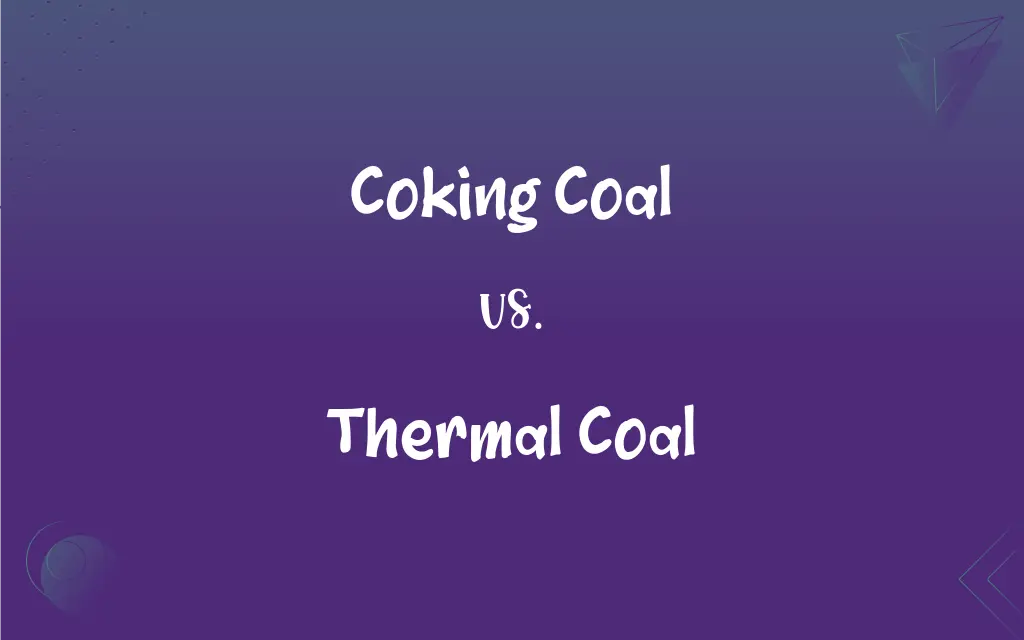Coking Coal vs. Thermal Coal: What's the Difference?
Edited by Aimie Carlson || By Harlon Moss || Published on December 9, 2023
Coking coal, used in steel production, turns into coke when heated without air; thermal coal, primarily for power generation, burns to produce heat.

Key Differences
Coking coal is a high-quality coal with specific properties that allow it to be converted into coke, crucial for steel manufacturing. Thermal coal, on the other hand, is used predominantly in power plants for generating electricity, where its calorific value is key.
The primary distinguishing factor of coking coal lies in its ability to soften, swell and then re-solidify into hard coke when heated in the absence of air. In contrast, thermal coal is valued for its high energy content, burning efficiently to produce heat for electricity generation.
Coking coal undergoes a process called coking, creating a solid carbon material (coke), necessary for the reduction of iron ore in blast furnaces. Conversely, thermal coal is directly combusted in boilers to produce steam for turbines in power generation.
Metallurgical properties are central to coking coal, including its low sulfur and ash content, and its ability to form coke with strength and porosity. Thermal coal, however, is primarily assessed for its energy content, ash, and moisture levels, influencing its efficiency in power generation.
In terms of environmental impact, the use of coking coal in steel production is a more specialized process with specific emissions, distinct from those of thermal coal, which is one of the major fossil fuels contributing to global CO2 emissions in electricity generation.
ADVERTISEMENT
Comparison Chart
Usage
Used in steel production
Used for electricity generation
Process
Turns into coke when heated without air
Burns to produce heat
Energy Content
Not a primary concern
High energy content is crucial
Environmental Impact
Specific emissions from steel production
Major contributor to CO2 emissions in power generation
Properties
Must have low sulfur and ash content
Quality judged by energy, ash, and moisture levels
ADVERTISEMENT
Coking Coal and Thermal Coal Definitions
Coking Coal
This coal undergoes a coking process, creating a solid carbon material.
The coking process transformed the coal into essential coke for the furnace.
Thermal Coal
Thermal coal burns to produce steam for driving turbines in power generation.
Thermal coal's combustion is key to producing steam for turbines.
Coking Coal
Coking coal has specific properties that enable it to soften and then re-solidify into coke.
The unique characteristics of coking coal facilitate the creation of coke.
Thermal Coal
It is one of the major fossil fuels contributing to global CO2 emissions.
Environmental concerns over thermal coal focus on its CO2 emissions.
Coking Coal
Coking coal is a type of coal that can be converted into coke for steelmaking.
The blast furnace required coking coal to produce steel.
Thermal Coal
This coal type is assessed for its energy, ash, and moisture levels.
Quality checks for thermal coal include analyzing its energy content.
Coking Coal
It is a primary raw material in the steel manufacturing industry.
Steel plants heavily rely on coking coal for their production processes.
Thermal Coal
Thermal coal is primarily used for generating electricity in power plants.
The power station uses thermal coal for its daily operations.
Coking Coal
It is known for its low sulfur and ash content, crucial in producing high-quality steel.
Coking coal's low impurities make it ideal for steel production.
Thermal Coal
It is known for its high calorific value, making it efficient for combustion.
The high energy content of thermal coal makes it valuable for electricity generation.
FAQs
How is thermal coal used?
Thermal coal is used primarily for generating electricity in power plants.
Can coking coal be used for power generation?
Technically yes, but it is economically inefficient due to its specialized properties.
What is coking coal?
Coking coal is a high-quality coal used to produce coke for steelmaking.
Why is thermal coal important for power generation?
Its high calorific value makes it efficient for producing electricity.
Is coking coal environmentally friendly?
It contributes to CO2 emissions, but its impact is specific to steel production.
How does thermal coal affect the environment?
It is a major contributor to global CO2 emissions in electricity generation.
Can coking coal be replaced in steelmaking?
Alternative methods exist, but coke made from coking coal remains predominant.
What is the key property of coking coal for steel production?
Its ability to form coke with strength and porosity.
What makes coking coal unique?
Its ability to turn into coke, a crucial component in steel production.
How does the combustion of thermal coal work in power generation?
It burns to produce heat, creating steam that drives turbines.
Are there cleaner alternatives to coking coal in the steel industry?
Emerging technologies like hydrogen reduction are being explored.
Can thermal coal be replaced in all power plants?
While possible, it depends on the availability and feasibility of alternative energy sources.
Does thermal coal have any specific quality requirements?
Yes, it's assessed for energy content, ash, and moisture levels.
What are the environmental challenges with coking coal?
Its use leads to emissions of CO2 and other pollutants in steel production.
Why is thermal coal a concern for climate change?
Its combustion is a significant source of greenhouse gas emissions.
What is the future outlook for coking coal and thermal coal?
Both face environmental challenges, with shifts towards cleaner energy sources and production methods.
What happens during the coking process?
Coking coal is heated in the absence of air, turning it into coke.
How is thermal coal different from other coal types?
It's characterized by its high energy content and efficiency in power generation.
Are there substitutes for thermal coal in power plants?
Yes, renewable energy sources like wind, solar, and hydro are alternatives.
What is the main use of coke produced from coking coal?
It's used as a reducing agent in blast furnaces for steel production.
About Author
Written by
Harlon MossHarlon is a seasoned quality moderator and accomplished content writer for Difference Wiki. An alumnus of the prestigious University of California, he earned his degree in Computer Science. Leveraging his academic background, Harlon brings a meticulous and informed perspective to his work, ensuring content accuracy and excellence.
Edited by
Aimie CarlsonAimie Carlson, holding a master's degree in English literature, is a fervent English language enthusiast. She lends her writing talents to Difference Wiki, a prominent website that specializes in comparisons, offering readers insightful analyses that both captivate and inform.







































































